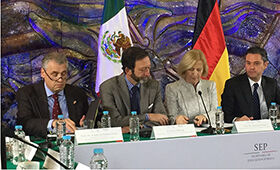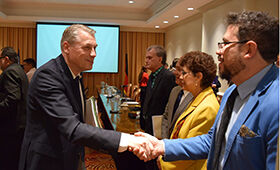Vocational education and training alliances with Mexico and Costa Rica
Mexico and Costa Rica are seeking to expand vocational education and training along the lines of the German model. In order to boost the specific cooperation between these two countries and Germany, the President of the Federal Institute for Vocational Education and Training (BIBB), Friedrich Hubert Esser, accompanied Federal Minister of Education Johanna Wanka on a working trip to Latin America.
The programme included the signing of a Declaration of Intent by Ms. Wanka and Enrique Cabrero, Director General of the Mexican Innovation and Research Council (CONACYT). The main aim here is to encourage and foster greater international cooperation with universities and research institutions on the part of the large number of German SME’s in Mexico. In Costa Rica too, representatives from the host country and Germany also agreed to collaborate more closely.
President Esser’s engagements in Mexico City included an invitation from the Mexican Minister of Education Aurelio Nuño Mayer to take part in top-level talks on dual vocational education and training. He explained the reasons behind the success of the German system – coordination between the state and trade and industry, the acceptance of national standards, learning during the work process, qualified training staff and institutionalised research and consultancy services. Professor Esser also advised his hosts to commit fully to the further development of the Mexican model of dual training (MMFD) and urged them to learn from the experiences of Germany, Austria and Switzerland in order to meet the worldwide challenges of vocational education and training.
He also emphasised the uniformity of German VET, in which consideration was always accorded to further training and to regional variances. “Further training provision and the demonstration of prospects and career pathways also prevent others from poaching trained staff,” Professor Esser added. Educational policy instruments such as the German Qualifications Framework were in place to illustrate the equivalence of vocational and academic education.
In 2015, the Federal Ministry of Education and Research, the Federal Ministry for Economic Cooperation and Development (BMZ), the Mexican Ministry of Education (SEP) and the Mexican Foreign Ministry had signed a Memorandum of Understanding on cooperation in vocational education and training. At the same time, a bilateral working group under the lead management of the BMBF was set up to act as an important framework for policy agreement. Mexico has been piloting its model of dual VET since 2013, and national implementation and qualitative consolidation of this MMFD are explicit objectives of the Mexican government.
BIBB has been advising its Mexican partner institute CONALEP since 2009. The way in which the German side is supporting Mexico within the scope of an overall German approach to the further development of the MMFD is fully in line with the Federal Government's strategy to move towards greater cohesion in international vocational education and training cooperation by delivering services from a single source (2013).
BIBB and the German Office for International Cooperation in Vocational Education and Training (GOVET) will work on behalf of the BMBF over a period of three years to offer advice on the topics of “an institutional and legal framework for dual vocational education and training” and “research and development for dual training”. In 2015, the BMZ commissioned the German Agency for International Cooperation (GIZ), to implement a project for technical cooperation in the field of VET in Mexico by the end of 2018.
From Mexico, the delegation travelled on to Costa Rica. The main focuses of this visit were to enhance academic research networking between Costa Rica and Germany and to take part in discussions on issues relating to dual training in the former. A Declaration of Intent was signed with the Ministry of Education and Ministry of Economic Affairs of Costa Rica.

